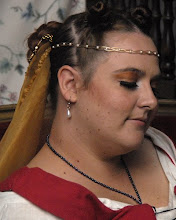(Dancing was popular throughout all levels of society. You will be familiar with this art. You may demonstrate your ability by performing at least three dances of different kinds. You must name the place of origin and the time period of each dance and must be able to teach at least one of them. This category ill be judged at a Dance Practice. )
Dances listed below
I taught Black nagg and Black Almain on May 6th at the Raven Hyrst Dance practice
Black Nagg (Playford 3rd edition - 1657)
Setting: A longways set of 3 couples.
Verse:
1- 4 Double forward, double backward.
5- 8 Repeat.
Chorus:
9-10 Face partner, take 2 hands. First couple slips up hall,
11-12 followed by the second couple,
13-14 and then third,
15-16 all turn single.
17-24 Couples slip back to place in reverse order, all turn single.
Verse:
1- 8 Siding.
Chorus:
9-10 First man and 3rd woman change places,
11-12 first woman and 3rd man do the same,
13-14 followed by 2nd man and 2nd woman,
15-16 all turn single.
17-24 Do the changes again to return to place, all turn single.
Verse:
1- 8 Arming.
Chorus:
9-14 Men's hey,
15-16 [men turn.]
17-24 Women's hey,
25-26 [women turn.]
Heart’s Ease (first edition Playford [1651 - registered in 1650])
Setting: A set of 2 couples (facing each other).
1- 4 Double towards the other couple, double away,
5- 8 repeat 1-4.
9-10 Face your partner and double backwards, away from them,
11-12 double towards partner, 13-16 turn your contrary by the right.
17-18 Face your contrary and double backwards, away from them,
19-20 double towards contrary,
21-24 turn your partner by the left.
1- 4 Side right with your partner,
5- 8 side left with your contrary.
9-24 Repeat
9-24. 1- 4 Arm right with your partner,
5- 8 arm left with your contrary.
9-24 Repeat 9-24.
Note: Playford's ``contrary'' is generally called a corner or opposite in modern folkdance.
Transcription: Meet all a D. fall back a D. ?u?.? That againe ?u?:? Men fall back from your We. meet again and turne Co. once round with the right hand ?u?.? All fall back from the Co. they turne, meet againe and turn your owne with the left hand. Sides all with your owne, then with the Co. ?u?.? That againe ?u?.? As before ?u?:? Armes all with your owne ?u?.? That again with the Co. and fall backe from your owne first, as before ?u?:? As before ?u?:?
Black Almain- Inns of Court manuscripts.
Setting: A processional line of couples.
1- 8 4 doubles forward.
9-12 Face partner and drop hands. Double backwards away from partner, double forward towards partner.
13-16 Quarter-turn left (men face up the hall, women face down the hall), double forward up or down the hall, turn around over your right shoulder, double back to place.
17-20 Face partner; men set and turn in place.
21-24 Women do the same.
25-26 Take both hands, turn halfway using one double into partner's place,
27-28 4 slip steps up hall.
29-32 Turn halfway back to your own side, 4 slip steps down hall.
33-36 Drop hands, double backward away from partner, double forward towards partner.
1-36 Repeat with the women setting and turning in place first, followed by the men.
Transcription: Honour. Fowre doubles forward, part handes with a .d. backe, meete again with a .d., A .d. on your lefte hand, a nother on your right hand, the man doe .2. .S. & a .d. rounde, the woman as much, take both handes, change places with a double & slide upwardes .4., Into your own place with a .d., Slyde downe .4., backe a .d. one from another, meet againe. The same againe. Bodleian Library MS Douce 280 (c. 1605/6), transcribed by Wilson Discussion:
A comment in one of the Inns of Court manuscripts, mentioned by Wilson, says that the dance was one of `the newest tunes that are now in vse' in 1584. However, this ballad to the tune is reprinted in Collmann's Ballads and Broadsides chiefly Of the Elizabethan Period; this ballad can be dated to 1570-1 via the Stationers' Register.
A proper new balade expressyng the fames, Concerning a warning to al London dames.
To the tune of the blacke Almaine.
You London dames, whose passyng fames
Through out the world is spread, In to the skye, ascendyng hye To euery place is fled :
For thorow each land and place, For beauties kyndely grace :
You are renowmed ouer all, You haue the prayse and euer shall.
What wight on earth that can beholde More dearer and fayrer dames than you? Therefore to extoll you I may be bolde, Your pace and graces so gay to vieu.
Subscribe to:
Post Comments (Atom)

No comments:
Post a Comment